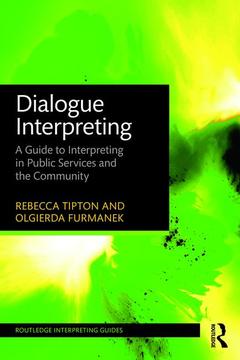Dialogue Interpreting A Guide to Interpreting in Public Services and the Community Routledge Interpreting Guides Series
Auteurs : Tipton Rebecca, Furmanek Olgierda

Routledge Interpreting Guides cover the key settings or domains of interpreting and equip trainee interpreters and students of interpreting with the skills needed in each area of the field. Concise, accessible and written by leading authorities, they include examples from existing interpreting practice, activities, further reading suggestions and a glossary of key terms.
Drawing on recent peer-reviewed research in interpreting studies and related disciplines, Dialogue Interpreting helps practising interpreters, students and instructors of interpreting to navigate their way through what is fast becoming the very expansive field of dialogue interpreting in more traditional domains, such as legal and medical, and in areas where new needs of language brokerage are only beginning to be identified, such as asylum, education, social care and faith.
Innovative in its approach, this guide places emphasis on collaborative dimensions in the wider institutional and organizational setting in each of the domains covered,and on understanding services in the context of local communities. The authors propose solutions to real-life problemsbased on knowledge of domain-specific practices and protocols, as well as inviting discussion on existing standards of practice for interpreters. Key features include:
- contextualized examples and case studies reinforced by voices from the field, such as the views of managers of language services and the publications of professional associations. These allow readers to evaluate appropriate responses in relation to their particular geo-national contexts of practice and personal experience
- activities to support the structured development of research skills, interpreter performance and team-work. These can be used either in-class or as self-guided or collaborative learning and are supplemented by materials on the Translation Studies Portal
- a glossary of key terms and pointers to resources for further development.
Dialogue Interpreting is an essential guide for practising interpreters and for all students of interpreting within advanced undergraduate and postgraduate/graduate programmes in Translation and Interpreting Studies, Modern Languages, Applied Linguistics and Intercultural Communication.
List of figures
List of tables
Acknowledgements
Permissions
List of abbreviations
Introduction
Chapter 1: Foundations for Continuing Professional Development
Chapter 2: Legal Interpreting I: Criminal Procedures
Chapter 3: Legal Interpreting II: Asylum Procedures
Chapter 4: Healthcare Interpreting
Chapter 5: Educational Interpreting
Chapter 6: Social Care Interpreting
Chapter 7: Faith-related InterpretingConcluding Remarks
Glossary
Appendices
Appendix 1
Appendix 2
Appendix 3
Appendix 4
Index
Rebecca Tipton is a Lecturer in Interpreting and Translation Studies at the University of Manchester, UK. Her publications include an entry on trust in interpreting in the Routledge Encyclopaedia of Interpreting Studies (Routledge, 2015).
Olgierda Furmanek is an Associate Professor and a Founding Director of a graduate programme in Interpreting and Translation Studies at Wake Forest University, North Carolina, USA. Her publications include Emotions and Language Choices in Multilingual Discourse (2005).
Date de parution : 02-2016
15.6x23.4 cm
Date de parution : 02-2016
15.6x23.4 cm
Thème de Dialogue Interpreting :
Mots-clés :
Interpreting; Interpreting Studies; Public Service Interpreting; Rebecca Tipton; Routledge Interpreting Studies Guides; Immigration and asylum interpreting; Legal interpretation; Remote interpreting; Professional Development; Community interpreting; Wake Forest Baptist Medical Center; Young Man; Interpreter Mediation; Lit Er; Religious Congregations; Language Interpreting; PERFORMANCE SKILLS Activity; Healthcare Interpreting; Reflective Practice; Domain Specific Competencies; LEP Patient; Cpd Activity; Spoken Language Interpreting; Dialogue Interpreting; Young Interpreter; Instructional Consultation; Medical Interpreters; Professional Development Planning; Asylum Procedures; LEP; Instructional Consultation Process; Research Social Work Education; Cobb County School District



